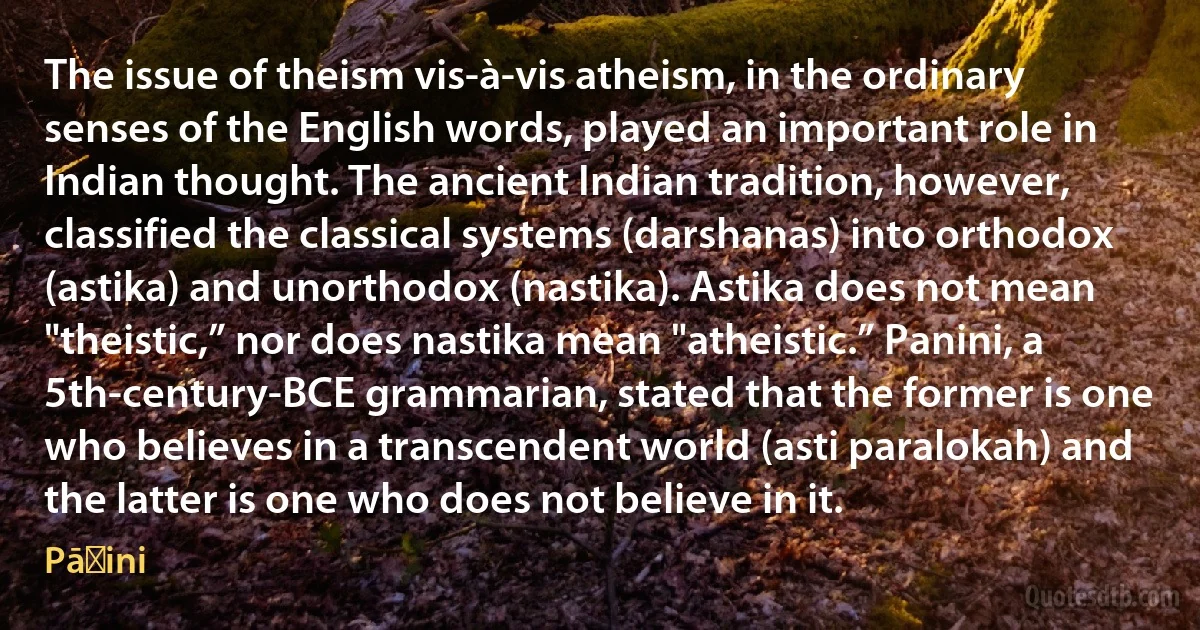
The issue of theism vis-à-vis atheism, in the ordinary senses of the English words, played an important role in Indian thought. The ancient Indian tradition, however, classified the classical systems (darshanas) into orthodox (astika) and unorthodox (nastika). Astika does not mean "theistic,” nor does nastika mean "atheistic.” Panini, a 5th-century-BCE grammarian, stated that the former is one who believes in a transcendent world (asti paralokah) and the latter is one who does not believe in it.
PāṇiniRelated topics
atheism believe classical classified english grammarian mean nor orthodox theism thought transcendent vis-a-vis world words paniniRelated quotes
Consider what you have in the smallest well-chosen librarya company of the wisest and wittiest men which can be plucked out of all civilized countries in a thousand years. The men themselves were then hidden and inaccessible. They were solitary, impatient of interruption, and fenced by etiquette. But now they are immortal, and the thought they did not reveal, even to their bosom friends, is here written out in transparent words of light to us, who are strangers of another age.

Ralph Waldo Emerson
The man who has struggled bravely with the passions of the body, has fought ably against unclean spirits, and has expelled from his soul the conceptual images they provoke, should pray for a pure heart to be given him and for a spirit of integrity to be renewed within him (cf. Ps. 51:10). In other words, he should pray that by grace he may be completely emptied of evil thoughts and filled with divine thoughts, so that he may become a spiritual world of God, splendid and vast, wrought from moral, natural and theological forms of contemplation.

Maximus the Confessor
Unbelievers, those who believe with difficulty, or believe in part, are those who do not show their faith through works. Apart from works the demons also believe (cf. Jms. 2:19) and confess Christ to be God and Master. 'We know Who You are' (Mk. 1:24), they say, 'You are the Son of God' (Mt. 8:29), and elsewhere, 'These men are the servants of the Most High God' (Acts 16:17). Yet such faith will not benefit the demons, nor even humans. This faith is of no use, for it is dead.

Symeon the New Theologian
Although it is rarely noted in histories of the American Revolution, many of the arch-Revolutionaries came from a tradition of mystical fraternity. Except for such traces as the symbols on the reverse side of the Great Seal and the dollar bill, little evidence remains of this esoteric influence (Rosicrucian, Masonic, and Hermetic). That sense of fraternity and spiritual chisement played an important role in the intensity of the Revolutionaries and their commitment to the realization of a democracy.

Marilyn Ferguson
Atheism ... in its philosophic aspect refuses allegiance not merely to a definite concept of God, but it refuses all servitude to the God idea, and opposes the theistic principle as such. Gods in their individual function are not half as pernicious as the principle of theism which represents the belief in a supernatural, or even omnipotent, power to rule the earth and man upon it. It is the absolutism of theism, its pernicious influence upon humanity, its paralyzing effect upon thought and action, which Atheism is fighting with all its power.

Emma Goldman
